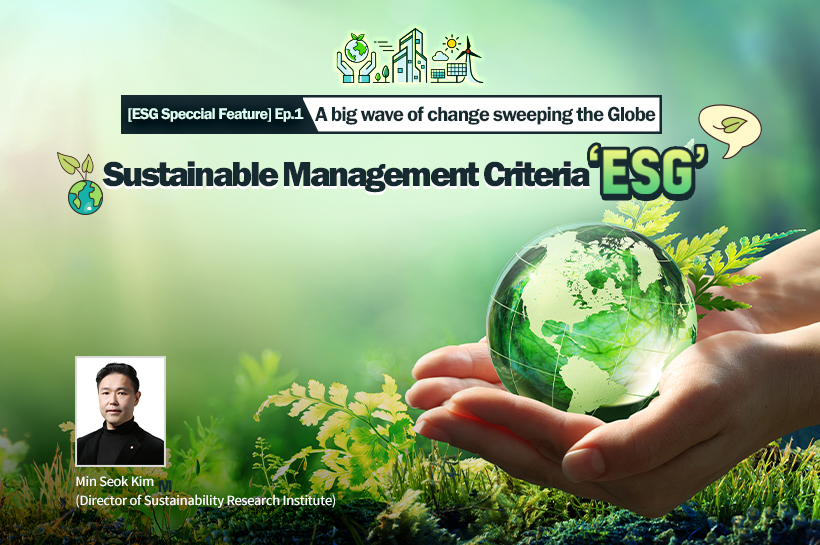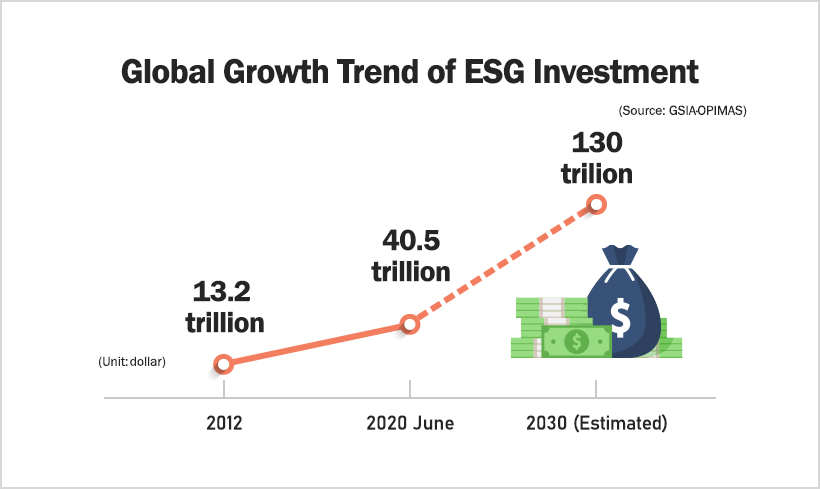
In January 2020, an annual letter sent by CEO Larry Fink of BlackRock, the world's largest asset management company, to the CEOs of major corporations became a hot topic. The letter said BlackRock would reflect climate risk and ESG factors as key elements for investment decision-making. Blackrock explained, "By looking at the environmental, social and governance factors, investors can effectively gain essential insights on corporate management, and this also allows them to get a long-term outlook for the company". Through the letter, BlackRock conveyed its ambition to carry out sustainable investment strategies that embed ESG insights into traditional investment methods.
Meanwhile, the European Union (EU) began to actively utilize ESG strategies by introducing regulations on ESG disclosure and classification systems and to apply them to non-EU financial companies that sell financial products in Europe as well as most European financial companies.
Korea is on the same page too. In March, the National Assembly launched the “ESG Forum” and held an inaugural and commemorative seminar. 58 ruling and opposition lawmakers and 128 organizations including companies, financial institutions, and ESG-related specialized agencies participated in the forum with a shared recognition that ESG is an important opportunity to take industrial competitiveness to the next level. Likewise, there is a growing interest in ESG investing and management both at home and abroad.
When and where did the ESG concept stem from?

In the last 1 or 2 years, many companies, including public entities, have declared that they will engage in ESG management. What is ESG, and why does it matter to not only businesses and governments but also academia and civil society?
ESG stands for environmental, social, and governance. It originated from the concept that investors should not only factor in the company’s financial information but also non-financial indicators, i.e., the ESG criteria, in their investment approach.
Many believe that the term ESG is first known to the public at New York Stock Exchange in April 2006 when the then former UN Secretary-General Kofi Annan and heads of major pension funds declared the UN Principles of Responsible Investment (UN PRI). The term ESG, however, was officially first used in 2004 in an initiative entitled “Who Cares Wins”. The initiative was jointly proposed by the UN Global Compact, International Finance Corporation (IFC), in collaboration with the Swiss government. In June 2004, the UN Global Compact stated the acronym ESG in the initiative, which was endorsed by 20 large financial institutions, to argue that companies should manage the environmental, social, and governance related issues for their successful performance, especially to increase shareholder values. The UN Global Compact was convinced that incorporating environmental, social, and governance factors into investment decision-making can create a sound investment market and thus bring about further advanced society. The initiative was followed by the declaration of the UN PRI in 2006. Since then, the concept of ESG investment has been in full swing with the six principles mandating investors to fulfill their obligations and responsibilities.
ESG Management; Up-to-date trend for corporate management paradigm

What triggered this change?
The EU emphasized the gravity of the climate crisis by launching the 'European Green Deal' in 2019. In the US, the Biden administration returned to the Paris Climate Agreement, which the former president Trump withdrew. It announced a goal of net-zero emissions by 2050, along with a budget investment for clean energy. In addition, in August 2019, the US Business Roundtable (BRT) signed a statement on the purpose of a corporation. The renewed statement argues that individual companies should no longer advance only the interest of shareholders but commit to all of their stakeholders, including employees, partner companies, and local communities. It is fair to say that the BRT declared to pursue a transition from shareholder-centric capitalism to stakeholder-centric capitalism that highlights corporate sustainability.
Companies now agree that environmental, social, and governance issues are no less valuable than their financial value. At Samsung Electronics Shareholders' Meeting in March, Samsung Electronics emphasized corporate responsibility on the environment and society, saying, “We are carrying out various activities to improve environment such as enhancing energy efficiency and reducing harmful substances for sustainable growth. We are also fully committed to our social responsibility activities such as supporting more youth to receive a quality education”. In addition to Samsung, many companies are getting into their stride for ESG management, such as creating ESG-dedicated organizations and setting up a relevant committee within the board of directors.

Global companies are also actively committed to ESG programs. Google set a goal of achieving carbon neutrality by 2030 and is proactively responding to the impact of climate change, emphasizing that they are developing technologies that help people to do more things for the planet. As a result, Google became the first company to use 100% renewable energy. The company also runs a program to support environment-related startups to respond to climate change by donating 20 million euros. Moreover, IBM, a global IT consulting company, is also investing in ESG management, including activities that support better quality food and sustainability for the agricultural ecosystem by providing AI-based insights.
ESG evolving into a prerequisite, how it changes the world?

Although ESG is receiving great attention recently, the concept that encourages companies to value environmental, social, and governance factors have been in practice since the 1970s in the name of CSR or sustainability management. If there is a change from the old days, it would be a difference in perception. In the past, it was regarded as a campaign for a company’s social contribution, but now it has become a necessity for a company’s survival.
In Korea, the Financial Services Commission announced that it would mandate KOSPI-listed companies with assets of 2 trillion won or more to disclose ESG reports starting from 2025 and gradually expand the mandatory disclosure rule to all listed companies in the securities market after 2030. Prior to this, in November 2020, the National Pension Service announced that it would increase the investment share that considers ESG performance to more than 50% of its total portfolio. However, Europe was the first-mover of the ESG disclosure regulations.
In 2017, the EU mandated the disclosure of ESG-related information for companies with 500 or more employees. In other words, the EU created an environment in which companies must disclose ESG-related information to operate corporate within the EU or do business with companies in the EU, and may face disadvantages if they do not comply with the regulations. Since 2018, the European authority has been expanding the scope of the Non-Financial Reporting Directive (NFRD), which has applied to European companies. Not long ago, the EU amended NFRD provisions to include all listed companies starting from 2025. In March this year, the coverage of mandatory disclosure by the directive further broadened from existing pension funds to financial companies such as banks, insurers, and asset managers.
The UK also announced last November that it would make the ESG-reporting mandatory to all listed companies. From this year onwards, the UK orders large pension funds to report the ESG information in line with the Task Force on Climate-related Financial Disclosures (TCFD). If not reported, British authorities plan to impose up to £50,000 (approx. KRW 78 million) as fines. Hong Kong also set a goal of becoming a sustainable financial center and decided to introduce mandatory TCFD-aligned disclosure to financial companies and publicly traded companies in Hong Kong by 2025. Likewise, Korea and many other European and Asian countries emphasize ESG in investment strategies, and the US is recently highlighting the importance of corporate social responsibility centering around environmental issues.
Turn crisis into opportunity! ESG is a new opportunity!

Then how should companies respond to the sudden rise of ESG in corporate management? ESG can be a new challenge for some companies, while others may see this as an opportunity.
Samsung Display announced in February that it joined the 'Responsible Business Alliance' (RBA) membership. Formed in 2004, the RBA today comprises of more than 160 companies in industries such as electronics, retail, and automobiles. Member companies have significant influence as their combined revenue is over $ 5 trillion, and the number of directly employed employees is about 6 million. Member companies of RBA shall require at least their first-tier suppliers to implement the RBA Codes of Conduct, and it estimated that thousands of companies from more than 120 countries fall under RBA’s requirement and over 3.5 million employees working there.
The RBA requires the Code participants as well as their overall supply chains to engage in high-level management in five areas: human rights and labor, corporate ethics, the environment, health and safety, and management systems. Moreover, RBA recommends its members to do self-assessment and third-party audits of how well they comply with these standards.
Joining the RBA membership, Samsung Display declared that it would not just end up observing domestic laws and norms but also comply with this strict code of conduct necessary for global business. On top of this, Samsung Display newly organized the ‘Sustainable Management Secretariat’ to bolster ESG performance and formed a consultative body on ESG strategy involving entire business departments to promote systematically ESG-valued corporate management. Under the secretariat leadership, the display giant established mid-and long-term strategies in five focus areas: Climate change, Resource circulation, Sustainable products, Win-win collaboration with partners, and the Local community.

ESG management now provides an opportunity to serve as medical examinations for corporate to make the corporate more robust, beyond the assignments that the corporate needs to perform. ESG management became essential criteria to ensure the sustainability of society and the environment and to identify the survival of the corporate itself. Therefore, companies can assess and manage their non-financial risks in advance through ESG criteria.
The new normal era of ESG, and what should be our next move?

The era we are living in casts ESG criteria to investors and businesses. Requirements for the environment, society, and governance have been around for a while, but now they are asking for a higher level of corporate responsibility than in the past, and companies are facing considerable differences in fulfilling ESG values.
Therefore, companies should strive to create a better environment and world by assuming their social responsibilities in the global society and generating economic, social, and environmental values through ESG management. Companies should be the agents who can establish ESG management strategies tailored to their situation and conditions and properly execute them one by one to create a better world. We must prepare to be remembered as a proud company not only to current employees and members of society but also to future generations.
※ This article holds the editor’s opinion, and Samsung Display Newsroom’s stance or strategies are not reflected.

